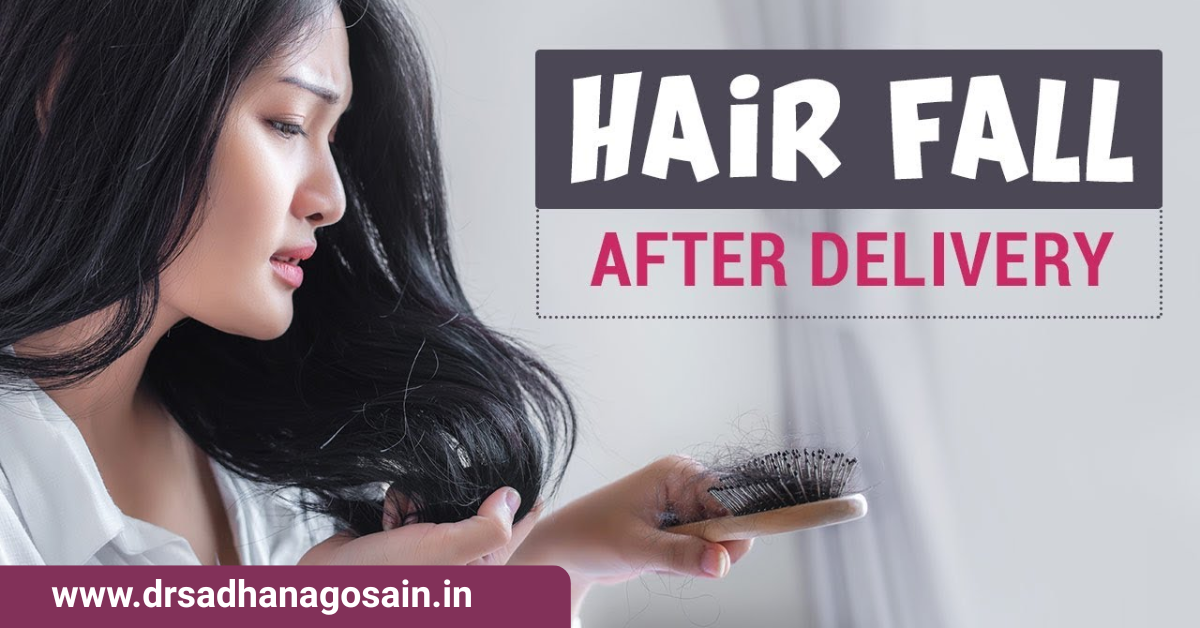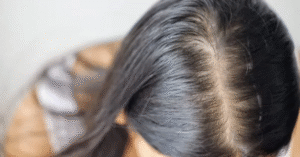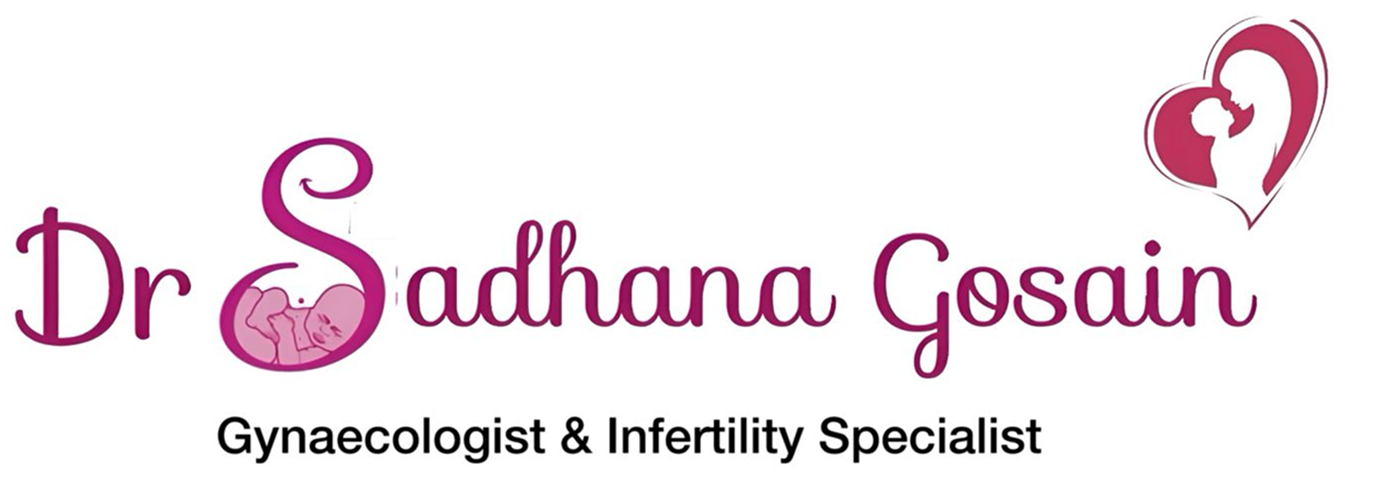
Hair Fall After Delivery – Postpartum Hair Loss Guide

Although giving birth is a wonderful experience, a mother’s body undergoes numerous changes. After giving birth, hair loss is one of the most frequent worries for new mothers. You’re not alone if you’ve noticed more hair on your pillow or in your brush. Many women experience postpartum hair loss, which is typically transient.
This guide will explain the causes of hair loss after delivery, how to treat it, and when to consult a doctor. Let’s take a step by step look at this journey.
Why Hair Fall After Delivery?
During pregnancy, the body’s hormones change a lot. One of these changes is that estrogen levels rise, which makes hair grow longer. This is why many pregnant women have thicker, shinier hair. After giving birth, estrogen levels start to level off, especially in the first two to four months.
This change in hormones causes a lot of hair follicles to go into the resting phase which makes hair fall out. Telogen effluvium is a normal part of the body’s recovery after giving birth.

How Much Hair Fall is Normal After Delivery?
It’s common to lose up to 300-400 strands per day during the postpartum period. While this may seem alarming, it is generally temporary and subsides by the time your baby turns one year old.
However, if your hair fall continues beyond a year or worsens with time, it’s wise to consult a medical expert such as a Gynecologist in Delhi for personalized care.
Factors That Influence Postpartum Hair Loss
Apart from hormonal changes, several other factors may contribute to hair fall after delivery:
- Lack of sleep and fatigue
- Poor nutrition
- Stress and anxiety
- Iron deficiency or anemia
- Thyroid imbalances
- Postpartum depression
- Genetics
View this post on Instagram
Tips to Manage Hair Fall After Delivery
Here are some effective ways to reduce and manage postpartum hair loss naturally:
1. Eat a Balanced Diet
Your body needs proper nutrition to recover from childbirth. Include iron-rich foods, protein, omega-3 fatty acids, and vitamins such as B12, D, and biotin in your daily meals. Leafy greens, lentils, eggs, nuts, and fruits like oranges and berries can be helpful.
2. Be Gentle With Your Hair
Avoid tight hairstyles, rough brushing, or using heat-styling tools frequently. Let your hair air dry and use a wide-tooth comb to prevent breakage. Use a soft hair towel instead of rubbing your hair with a rough cloth.
3. Choose the Right Hair Products
Switch to mild, sulfate-free shampoos and nourishing conditioners. Look for products that contain keratin, biotin, and natural oils like argan or coconut oil.
4. Scalp Massage
Regular scalp massage with warm oil like coconut or castor oil can improve blood circulation and promote hair regrowth. Massage your scalp for 10-15 minutes twice a week for best results.
5. Reduce Stress
Stress can worsen postpartum hair fall. Try relaxing activities like yoga, meditation, or gentle walks. Also, getting adequate sleep (even in short naps) can help the body heal faster.
6. Take Postnatal Supplements
Sometimes, your body may need extra nutrients that food alone can’t provide. Continue taking postnatal vitamins if advised by your doctor. Supplements with iron, zinc, and folic acid can be particularly helpful.
When Should You See a Doctor?
While hair fall after delivery is usually harmless, there are cases where it might signal something more serious. You should consult a doctor or gynecologist in Delhi if:
- Hair fall continues beyond 12 months postpartum
- You notice bald patches or thinning hairlines
- You experience fatigue, dry skin, or mood swings
- Hair loss is accompanied by dandruff, itching, or scalp redness
- These symptoms could point to thyroid issues, hormonal imbalances, or nutritional deficiencies.
Myths About Hair Fall After Delivery
Let’s bust a few common myths around postpartum hair fall:
Myth: Cutting hair short prevents hair fall.
Truth: Hair length doesn’t affect hair fall; what matters is hair care.
Myth: Breastfeeding causes hair loss.
Truth: There is no direct link between breastfeeding and hair fall. It’s mostly hormonal.
Myth: Hair fall will stop immediately after delivery.
Truth: It usually begins around 2-4 months postpartum and may last a few months.
Preventing Hair Fall – Can It Be Done?
While it’s hard to prevent hair fall after delivery completely due to hormonal reasons, you can reduce its severity with proper care. Eating nutritious food, staying hydrated, sleeping well, and gentle hair practices can make a significant difference.
Frequently Asked Questions (FAQs)
1. How long does postpartum hair loss last?
It typically lasts between 4 to 6 months, but for some women, it can take up to a year for hair growth to normalize.
2. Can I use hair oil or home remedies?
Yes. Oils like coconut, castor, and almond oil are known to strengthen roots and stimulate hair growth. Use them consistently but gently.
3. Should I take biotin for hair fall after delivery?
Biotin can help, but only take it if prescribed by a doctor. It’s best to address deficiencies through a balanced diet first.
4. Is postpartum hair loss reversible?
Yes, in most cases. With time and care, hair grows back and thickness improves naturally.
5. Can stress make hair fall worse after childbirth?
Yes, emotional and physical stress can increase hair fall. Try relaxation techniques and seek support when needed.
Final Thoughts
Hair fall after delivery is a common part of the postpartum journey. Although it can be distressing, understanding why it happens and how to care for your hair can make it easier to manage. Most importantly, remember that you’re not alone, and this phase is temporary.
If your symptoms are severe or persistent, don’t hesitate to consult a trusted gynecologist in Delhi for proper evaluation and treatment.
Motherhood brings many changes, and with the right care, you can embrace them confidently—one strand at a time.
Also Read:

